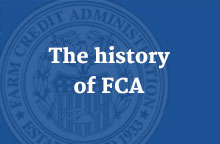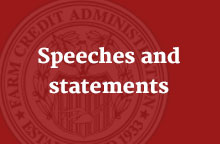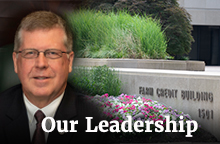Meet our employees
Alex, Examiner, Dallas
 "In our communication training, we’re given practice in asking tough questions, dealing with different opinions with staff at associations — like about rating the riskiness of a loan — and also at the agency. I’ve really improved at dealing with uncomfortable news."
"In our communication training, we’re given practice in asking tough questions, dealing with different opinions with staff at associations — like about rating the riskiness of a loan — and also at the agency. I’ve really improved at dealing with uncomfortable news."
Why FCA?
“I learned about FCA through a friend from college who works in the Denver office. I’d actually accepted an offer elsewhere — at a big financial institution — but I found the structured commissioning program and the travel at FCA attractive. I also liked the idea of a smaller workplace.”
Training
“I was a finance major in college. I’d studied stocks and investments. I had more of a corporate finance background so I needed to learn more about credit analysis and banking fundamentals. Before taking the FCA commissioning exam, we all take the same set of classes at the same time for three years.
“We all started in the Staff Development Division for two years and then moved to the Association Examination Division. Early on, I had an interest in our Capital Markets Division, which I am now a part of, where I analyze complex finance areas for the larger institutions we regulate. New associates might be able to follow up on a particular interest early on like I did. It really depends on availability.”
Lots of opportunities to hone skills
“I had limited experience coming out of college in credit and banking skills, only a class or two in each field. I’ve really improved in those areas and in my financial analysis skills.
“In college you don’t learn how to deal with challenging people and situations; you can only learn that through experience on the job. At work you get thrown into situations where you have to deal with disagreements in different situations. In our communication training, we’re given practice in asking tough questions, dealing with different opinions with staff at associations — like about rating the riskiness of a loan — and within the agency. I’ve really improved at dealing with uncomfortable news.
“Like most of my associate examiner class, I had no experience with the FCA writing style. It’s deductive — you start with your conclusion and work down to the details, as opposed to the more traditional college style. I’ve improved at that, and I understand why we do it that way. Writing was a weak subject for me in college. This way is more logical — be concise, get to the point, draw a conclusion, and support it with specific details and facts. I’m more of a bullet-point writer, and generally, I’ve been allowed to do that, depending on the assignment, so there’s some room here for personal style.”
Typical day
“I check my email first thing to catch up on things. I’m a week-by-week person, so I plan out a series of tasks for the week. I’m also a morning person, so I crank out the detailed, tough work in the morning, and, in the afternoon, I do more planning and preparation. If I have something coming up the next week when I’m going on-site, the afternoon’s the best time to start preparing for that, getting documents ready to go, doing a little research on the association I’m going to.
“When you’re in the office, there are plenty of people to reach out to if you need help, but you’re working on your individual assignments. I have always been able to find someone to answer any question I had.”
Working on bank examinations
“So far I’ve worked in about 15 states, spending about one week of travel per month, sometimes two.
“Working off-site is the opposite of on-site, where we do a lot of individual work. On-site, you’re usually on a team of about 10 people: 4 to 6 associate examiners, the examiner in charge, and roughly 4 other examiners who may be specialists in certain exam areas. We’re asking the association staff questions and talking with each other. It’s always exciting to ask senior management questions, and the expectations are high. On-site, I jump into team mindset. I’m doing my own individual work, but there’s a team supporting me, who I can bounce ideas off of.
“On-site is the time to work as hard as you can, do as much as you can in a limited amount of time. We have to prioritize and manage our time well and also respect the time of the staff at the association.
“Sometimes an association will show us one of their borrowers’ operations. Up in Pasco, Washington, we visited a few apple orchards with staff from the association to learn about how apples are grown and harvested.”
Benefits of working at FCA
“A big perk is the 401(k) retirement matching, and the work-life balance is awesome. My boss is very flexible about my schedule, letting me move my flex day around when I need to. Vacation time is generous. And the pay-grade structure gives set criteria for moving up. I really enjoy the travel. I’m a competitive, fast-paced person, and with the basic training complete, I really enjoy the work. A couple of opportunities I’ve taken part in are leading our summer intern project and, currently, working for our Capital Markets Division. FCA is a good place to put down some roots.”



